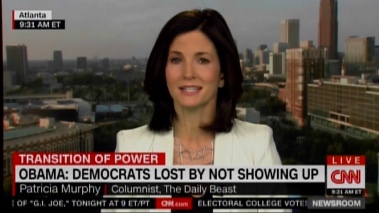I was just watching a brief segment on CNN about, among other things, the future of the Democratic party. The Daily Beast’s Patricia Murphy was one of the two panelists. And it was, frankly, embarrassing.
Murphy said in so many words that Democrats aren’t able to move forward because they have no theory of why they lost and in many cases think they actually won (because of the popular vote). “So when you have that kind of an attitude going forward there’s very little soul searching, very little effort to look inside and say what do we need to say and do differently in order to get more people to win? They’re writing off a large portion of the electorate as a group of people they don’t even want.”
I listen pretty closely to what Democrats say and if anything I hear more ‘throw the baby out with the bathwater’ talk in terms of targeting working class white voters in the industrial Midwest than writing off whole portions of the electorate. This whole riff was, I think, a good example of why Democrats generally should do as much as they possibly can to ignore this kind of gilded DC-centric pablum. It also points our attention to why how the Democrats move forward is actually more complicated than a lot of people really get, a lot more complicated than a lot of commentators want to get.
In 1984, Ronald Reagan won reelection by a 59% to 41% margin. He won 525 or 538 electoral votes. It was a reelection (incumbents are advantaged). The economy was on the upswing. The country had far, far less of the partisan divide which makes routs of that scale almost impossible today. But for all that it was not only a devastating loss in electoral terms it also showed that on a fundamental level the country was not buying what the Democratic party was selling.
In some ways George Bush’s 53% to 47% (426 of 538 electoral votes) win, while far narrower, drove the point home. Even trying for a third term with a generally weak candidate, the Republicans still managed to win and win decisively. The arc of Democratic candidates from Carter to Mondale to Dukakis to Clinton was a good deal more ideologically complex than the telescoped view through which we tend to look back on it. But this string of defeats lead Democrats to a good deal of soul searching and, for better or worse, a basic shift in their politics.
If Democrats today were in a comparable position their task would be considerably harder but their decision would be much easier. I’m sure there are some Democrats out there insisting they actually won the election but only lost on a technicality. But I have not heard from any who are focused on the popular vote who don’t get that as long as Democrats do not win the electoral vote there will be Republican Presidents who govern the country with destructive policies. I see little evidence that any substantial number of people don’t get that.
The fact that Hillary Clinton won the popular vote by almost 3 million votes makes it very hard to see the 2016 election as a referendum on the Democratic party or Democratic governance or a rejection of either. This isn’t just a matter of salving hurt feelings or looking on the bright side. The import is more concrete and unforgiving. All politics involves trade-offs. One bundle of issues gets you one coalition of voters. If you toss that bundle overboard you’ll probably lose some or possibly a lot of the voters you have. That’s difficult when you’re still pretty close to winning majorities of votes. It’s especially tough when you’re actually already winning majorities, at least of the two party vote. (This does not even get into the infinitely consequential issue of the political morality of potentially abandoning your most vulnerable and political loyal supporters.)
The consequences of the 2016 election are devastating. But it is important to distinguish causes and outcomes. The mechanics are not the same. I’ve already discussed that not only does the Democrats’ economic messaging need work but their policies do. Messaging is important. Policies drive messaging. Just as much, there is a failure of political organizing at the state level and local level. Some of that atrophy at the local level is a recurrent pattern that afflicts the party that holds the presidency for two terms in a highly partisan era (see what happened to Republicans in 2005-2009). But it is also the product of Democrats’ fixation on the presidential contest and a misplaced belief that demography is a sufficient driver of election wins. It is not. If 2016 teaches us anything it is that singular message.
There is a huge amount of work for Democrats to do. But a key part of that work is resisting the demand from the supercilious center that Democrats don sackcloth and ashes and repent of their ideals and even of themselves. Demography and ideology are critical. But require a politics and relentless organizing to give them force. That is where Democrats should be focusing their attention.






